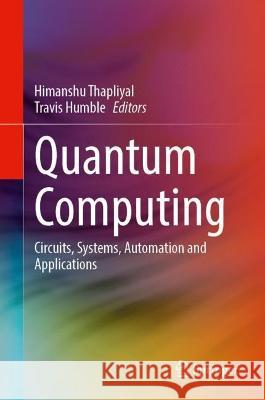Quantum Computing: Circuits, Systems, Automation and Applications » książka



Quantum Computing: Circuits, Systems, Automation and Applications
ISBN-13: 9783031379659 / Angielski
Quantum Computing: Circuits, Systems, Automation and Applications
ISBN-13: 9783031379659 / Angielski
(netto: 460,04 VAT: 5%)
Najniższa cena z 30 dni: 424,07 zł
ok. 16-18 dni roboczych.
Darmowa dostawa!
Introduction to Quantum Computing.- Quantum Circuit Synthesis.- Quantum Arithmetic Circuits.- Quantum Resource Estimation.- Quantum Compiler and Programming Languages.- Validation and Testing in Quantum Computing.- Quantum Computing Security.- Applications of Quantum Computing to fields such as Quantum Chemistry, Linear Algebra, Scientific Applications, Material Science, Machine Learning, etc..- Quantum Technologies: Superconducting, Trapped Ions, Spintronics, Cryogenic Electronics for Quantum Computing.
Himanshu Thapliyal is currently an Associate Professor with the Department of Electrical Engineering and Computer Science at the University of Tennessee, Knoxville, TN, USA. He received a PhD degree in Computer Science and Engineering from the University of South Florida, Tampa, in 2011 where he received the ‘Distinguished Graduate Achievement Award’. From 2012-14, he worked as a designer of processor test solutions at Qualcomm, where he received the Qualcomm QualStar Award for contributions to memory built-in self-test. He joined as an Assistant Professor at the University of Kentucky, Lexington in 2014 where he got promoted to Associate Professor in 2020. He has been ranked in the top 50 among scientists throughout the world in the field of ‘Computer Hardware and Architecture’ for the calendar Years 2019 and 2020. He is the recipient of the 2019 NSF CAREER award and the 2020 IEEE-CS TCVLSI Mid-Career Research Achievement Award. In March 2022, he is selected to the Inaugural Class of IEEE Computer Society Distinguished Contributors which recognizes his distinguished contributions to society and the profession. He has authored over 200 journal/conference articles with over 5950 citations (h-index of 46), and 3 US Patents. He received the Best Poster/LBR Award at the 2023 ACM Great Lakes Symposium on VLSI. He received Best Paper awards at the 2021 IEEE International Conference on Consumer Electronics (ICCE), 2020 IEEE World Forum on Internet of Things, 2017 Cyber and Information Security Research Conference (CISR), and 2012 IEEE Computer Society Annual Symposium on VLSI (ISVLSI). He is serving as the Section Editor of the Springer Nature Computer Science and is leading two sections. He has served/serving in editorial boards of journals including IEEE Transactions on Consumer Electronics, IEEE Consumer Electronics Magazine, IEEE Internet of Things Journal, and the Microelectronics Journal. He co-founded the International Workshop on Quantum Computing: Circuits Systems Automation and Applications (QC-CSAA). His students have received several awards including Best Papers, outstanding PhD and Master’s student awards, and secured positions in companies such as Google, Apple, Intel, Cadence, and Microsoft.
Travis Humble is Director at the Department of Energy’s Quantum Science Center, a Distinguished Scientist at Oak Ridge National Laboratory, and director of the lab’s Quantum Computing Institute. Travis is leading the development of new quantum technologies and infrastructure to impact the DOE mission of scientific discovery through quantum computing. As interim director of the QSC, Travis leads the innovation of scalable, resilient quantum information technologies through new materials, devices, and algorithms and facilitates the transfer of quantum technologies to the broadest audience. In addition, Travis serves as director of the OLCF Quantum Computing User Program by leading the management and operation of quantum computing technologies for a broad base of users. These revolutionary new approaches to familiar computational problems help reduce algorithmic complexity, reduce computational resource requirements like power and communication, and increase the scale at which state-of-the-art scientific applications perform. In this role, Travis leads the design, development, and benchmarking of quantum computing platforms. Travis is editor-in-chief for ACM Transactions on Quantum Computing and co-chair of the IEEE Quantum Initiative. Travis also holds a joint faculty appointment with the University of Tennessee Bredesen Center for Interdisciplinary Research and Graduate Education working with students on energy-efficient computing solutions. Travis received a doctorate in theoretical chemistry from the University of Oregon before joining ORNL in 2005.
This book provides readers with the current state-of-the-art research and technology on quantum computing. The authors provide design paradigms of quantum computing. Topics covered include multi-programming mechanisms on near-term quantum computing, Lagrange interpolation approach for the general parameter-shift rule, architecture-aware decomposition of quantum circuits, software for massively parallel quantum computing, machine learning in quantum annealing processors, quantum annealing for real-world machine learning applications, queuing theory models for (Fault-Tolerant) quantum circuits, machine learning for quantum circuit reliability assessment, and side-channel leakage in Suzuki stack circuits.
- Describes the latest progress in quantum circuits and design automation;
- Discusses circuits and systems targeting novel and existing applications of quantum computing;
- Includes resource consumption estimates for quantum computing systems and applications.
1997-2026 DolnySlask.com Agencja Internetowa
KrainaKsiazek.PL - Księgarnia Internetowa









